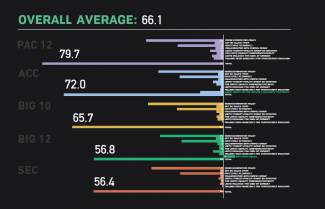Athlete Ally has published a report on the five power conferences in the NCAA to see how they each stack up to each other when it comes to LGBT athletes. Athlete Ally is an LGBT equality organization with a mission to empower athletes and eliminate homophobia and transphobia in sports.
The report, called the "Athletic Equality Index," helps measure power schools policies and practices. The most important thing it tried to accomplish was provide transparency and accountability.
LGBT athletes have struggled in sports, and while the tides are changing, there can still be obstacles for athletes. Performance can also be hindered by those who feel they need to stay in the closet.
In the past schools have cited a lack of data or research for not changing policies or making them more inclusive. Hudson Taylor, the founder and executive director of Athlete Ally, said, "institutions can no longer cite a lack of data and reporting as a rationale for inaction."
A weighted scale was used for the research. Schools with anti-LGBT policies were deducted points in the specified categories, while those who went out of their way to be pro-LGBT got bonus points. The results showed the PAC-12 leading with a score of 79.7, the ACC (72.0) was second, with Big Ten (65.7), Big 12 (56.8) and SEC (56.4) rounding out the five leagues.
The overall categories used were:
► School-wide nondiscrimination policies
► Openly LGBT staff members or vocal allies
► LGBT specific resources to which student-athletes can access
► Student-athlete led groups or recurring initiatives that discuss LGBTQ inclusion, diversity and equality
► A culture in which the athletic department collaborates with other campus identity centers
► Pro- LGBTQ inclusion campaigns or statements on behalf of the program
► A fan code of conduct that explicitly prohibits homophobic, transphobic, biphobic or sexist language and behavior
► A commitment to following the NCAA’s recommended guidelines for the inclusion of
transgender athletes on varsity teams
Key findings include:
40 of the 65 schools lacked an accessible student-athlete focused group or initiative to share experiences related to inclusion. And 35 of 65 schools lacked a statement, campaign or initiative that defined their LGBT-centered values.
Taylor concluded, "We hope the Athletic Equality Index will act as the catalyst needed for institutions to continue the pursuit of proactive LGBTQ-inclusive policies and practices"
You can read the full index here.
H/T: USA Today

